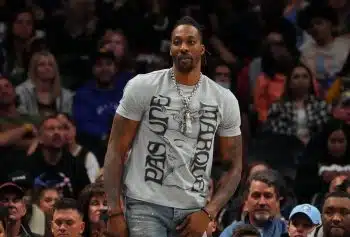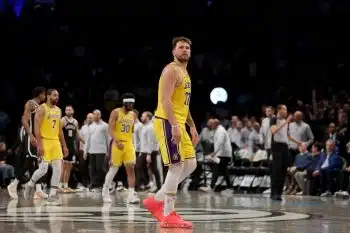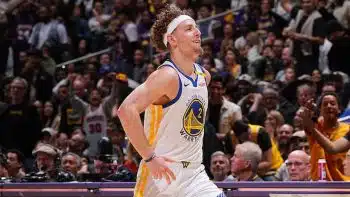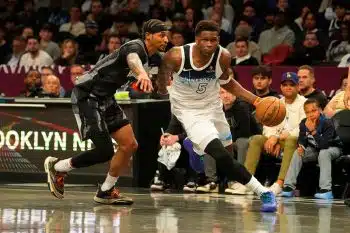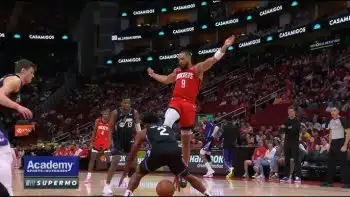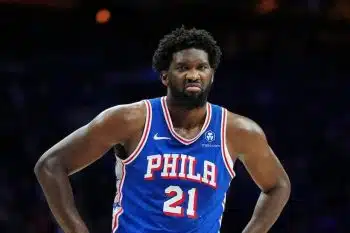NBA
NBA Sunday: How Too Much Cavs and Warriors Could Be Bad
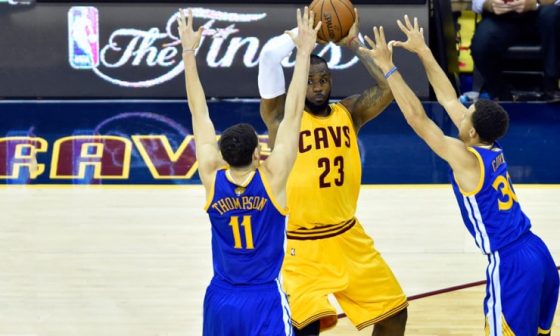
Yes, the Cleveland Cavaliers and the Golden State Warriors are on a collision course to meet in the first NBA Finals trilogy in history, and you didn’t have to be Nostradamus to see it coming—this was a foregone conclusion since Kevin Durant signed with the Warriors last July.
What people have been thinking aloud since then, though, has been whether or not this is bad for the NBA.
Despite what some may want you to believe, it truly is bad for business—though not necessarily in the way one might think.
* * * * * *
Dynasties are a part of professional sports. When the Dallas Cowboys, New York Yankees and Chicago Bulls were dominating the competition, many pundits wondered whether one or two teams having monopolies on their league’s championships negatively affected viewership.
History has proven that it hasn’t.
One metric that would be used to support that proposition is the extent to which games are watched on network television. As casual fans are less likely to spend big bucks on the cable networks that today televise the gross majority of NBA games, looking at the numbers when fans don’t have to pay to watch is a decent barometer to gauge interest.
During the 1995-96 NBA season, the league averaged a 5.0 rating for games broadcast on network television. That number has steadily declined since then, with a fairly dramatic dip in network television viewership occurring following the lockout of 1999.
Obviously, there are other metrics and projections that suggest that the league, in terms of viewership, is just fine. After all, there had to have been a reason for ESPN and Turner to agree to pay the NBA $24 billion over the next nine years, right?
Of course there is. As the media has become both better and more competitive, outlets have become aware of the need to develop and sell interesting storylines that would drive interest among even casual fans. Free agency and the contemporary player’s ability and willingness to change teams has caused July to become one of the league’s busiest months. LeBron James’ defection to Miami, subsequent return to Cleveland and Steve Kerr helping to lead the Warriors to the single-season win record—all of it matters. All of it impacts the league’s viewership and, ultimately, the price tag its able to attach to its product.
But what’s most important to understand about professional sports is that there is one thing that keeps the world turning—competition.
For the past 10 years, as we have witnessed the coming of age of the generation that heard the ridicule that the likes of Charles Barkley, Karl Malone, Reggie Miller, Patrick Ewing, Vince Carter, Allen Iverson and Steve Nash endured, they each decided to not be the next one to join that list.
Since Kevin Garnett and Ray Allen joined Paul Pierce in Boston, the modern NBA’s “super team” era began. Shaquille O’Neal was traded from Miami to Phoenix, Jason Kidd from New Jersey to Dallas and Pau Gasol to the Lakers.
Meanwhile, LeBron James, arguably the greatest player ever, tasted defeat. And to that, we were all witnesses.
LeBron defected to Miami, Chris Paul to Los Angeles and Dwight Howard and Nash to the Lakers. Carmelo Anthony went to the Knicks.
Each of the aforementioned All-NBA caliber talents, though they experienced varying degrees of success, all had one thing in common: they were attempting to form their own super teams, because, deep down inside, merely competing wasn’t good enough. It was championship or bust.
As a result, for the past 10 years, we have been witnessing and existing in the NBA version of the cold war, and the NBA’s superstars are the weapons of mass destruction.
Players like Paul George, Jimmy Butler, James Harden and Anthony Davis will eventually tire of the losing. As they sit back and see the likes of the Warriors and Cavaliers dominate the NBA and combine to monopolize the Finals for the foreseeable future, they too will eventually make the same decision of many of their predecessors.
In order to understand why this is bad for the league, one need to be able to see the entire forest, not just two or three of the trees.
* * * * * *
As he stood in all his glory, the Boston Celtics had emerged on top.
He shrugged and raised his eyebrows.
“That’s something we’d have to consider,” Wyc Grousbeck said as his Celtics had emerged from the 2017 NBA Draft lottery with the top overall pick.
The question that prompted the answer was whether and to what extent the Celtics would consider trading the first overall pick in the draft. Surely, with Markelle Fultz and Lonzo Ball having the perceived value of franchise-caliber players, they could engage the Bulls on a trade involving Jimmy Butler or the Pacers on one involving Paul George. And it would be something that the Celtics would have been wise to consider.
The politics of the NBA locker room make it nearly impossible to simultaneously build a contending team while stockpiling young players with superstar potential. Everyone wants shots, everyone wants touches and everyone wants a max contract. In a utopia, all players would be willing to sacrifice in the name of winning; but this is real life. This is business. So, the Celtics find themselves at a crossroads. In short order, the franchise will have to make a decision as to whether they will stick with their current core or take what appears to be two steps backward by turning the franchise over to a rookie point guard.
Had the Celtics truly been able to compete with the likes of the Cavaliers, the decision would have been difficult. But if the talent gulf between the Celtics and the Cavs is as wide as it appears, Ainge would be wise to trade away a few of the players on the roster who are already complaining about a lack of touches and riches and wait out LeBron’s demise.
Today, that’s the prevailing sentiment among many onlookers—James and his Cavaliers are so great, that there’s no hope in dethroning them. As he is a few months away from his 33rd birthday and still relies heavily on his athleticism, it stands to reason that he will soon begin to show signs of regression.
So, it is argued, the Celtics would be best served by drafting Fultz and eventually cutting bait with Kelly Olynyk, Marcus Smart and Isaiah Thomas. With Fultz, Jaylen Brown and the 2018 first rounder they will have from the Nets, in five years, the Celtics could become the next super team. It’s difficult to argue with the logic.
In the Western Conference, the outlook is a bit more bleak. Assuming the Warriors re-sign both Stephen Curry and Kevin Durant this summer, not one of their core four players will be 30 years old until the beginning of 2018-19 season. Sure, with Kawhi Leonard, the Spurs had the Warriors down big in Game 1 of their series, but nobody thought the Spurs would beat them four out of seven times.
So while there is nothing wrong with a dynasty, it’s important to remember the one thing that makes the world of professional sports turn—competition.
What happens when the second and third best teams in the league begin to believe that they simply can’t compete with the top-heavy teams with which they should compete?
Feelings of futility, complacency and the consideration of simply waiting it out—with the level of dominance that we have witnessed by the Warriors and the Cavs—are we really that far away from that?
Ask yourself that question again when the Eastern and Western Conference Champions arrive at the NBA Finals having gone a combined 24-0 in the playoffs.
That’s not good for any argument, or competitiveness, and it certainly isn’t good for business.
* * * * * *
Since Tom Chambers made history by helping the NBA’s 1988 free agent class the freedom of being unrestricted, players have long enjoyed their ability to choose where they live and work.
So don’t hate the player, hate the game.
Or better yet, hate the fact that we have collectively taught everyone that all that matters is winning a championship.
At the end of the day, it’s that attitude that has caused all of this.
So if and when you have a spare moment or two, cross your fingers that someone—anyone—can actually challenge the Cavs and Warriors. Because whether you like it or not, this type of dominance, the lack of competition they each appear to have and what it may inevitably do to the attitudes and psyches of NBA front offices is dangerous.
And in the long run, depending on which of the diverging roads the other teams toward the top of the respective conferences choose, the unprecedented dominance being witnessed by these Cavs and Warriors… It may certainly be bad for business.
